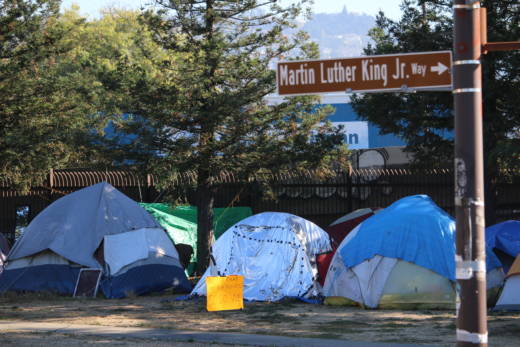Original post: A federal judge says he’ll soon decide whether to allow a homeless encampment in Berkeley to remain on BART property while a case asserting the constitutional rights of the homeless moves forward.
“We're asking him to do things that no judge has done in the past,” said Dan Siegel, an attorney with Siegel, Yee and Brunner, which represents encampment residents.
A few residents of the “Here There” encampment -- named after the iconic art installation on-site -- filed a complaint last week after receiving a 72-hour eviction notice from BART. Northern California District Judge William Alsup heard oral arguments Tuesday morning and said he will make a decision whether to grant a preliminary injunction in the next couple of days.
The question Alsup must answer: Would evicting residents from BART’s property cause irreparable harm to them?
Siegel argues that yes, it would. He told the judge that residents should be allowed to stay on BART’s property near Alcatraz Avenue and Martin Luther King Jr. Way, where they've been for around 10 months, because the city doesn't have enough housing for its homeless population.
“The alternative to being allowed where they’ve been camping is to be thrown out on the street,” Siegel said.
BART attorneys said the transit agency has a right to enforce state trespassing laws on its own property. They argued that proper 72-hour notice was given to residents and that they were pointed to housing and homeless services.
Attorney Kimberly Chin said BART is not in a position to assist the homeless and that letting people live on its property is a liability.
“That property is not suitable for long-term habitation,” Chin said. “There is no running water, there is no electricity.”
When asked by Judge Alsup whether the city has done enough to help its homeless population, Deputy City Attorney Savith Iyengar said Berkeley has spent millions of dollars trying to address the issue.
“The city has a responsibility to the broader community and to serve all residents,” Iyengar said.
The encampment is run by the group First They Came for the Homeless, which has advocated for the homeless the last couple of years. The encampment operates under a set of rules made by group consensus. Drugs and rowdy behavior are not tolerated, according to residents, but the city said there have been numerous complaints from neighbors and some calls to police near the site.
Alsup told Siegel he would have an “uphill battle” proving his case, but also recognized that Berkeley isn't doing enough to serve its homeless population.
“You’re the most liberal, progressive city government in America," he said. "If you haven’t done it, it’s not going to get done."
